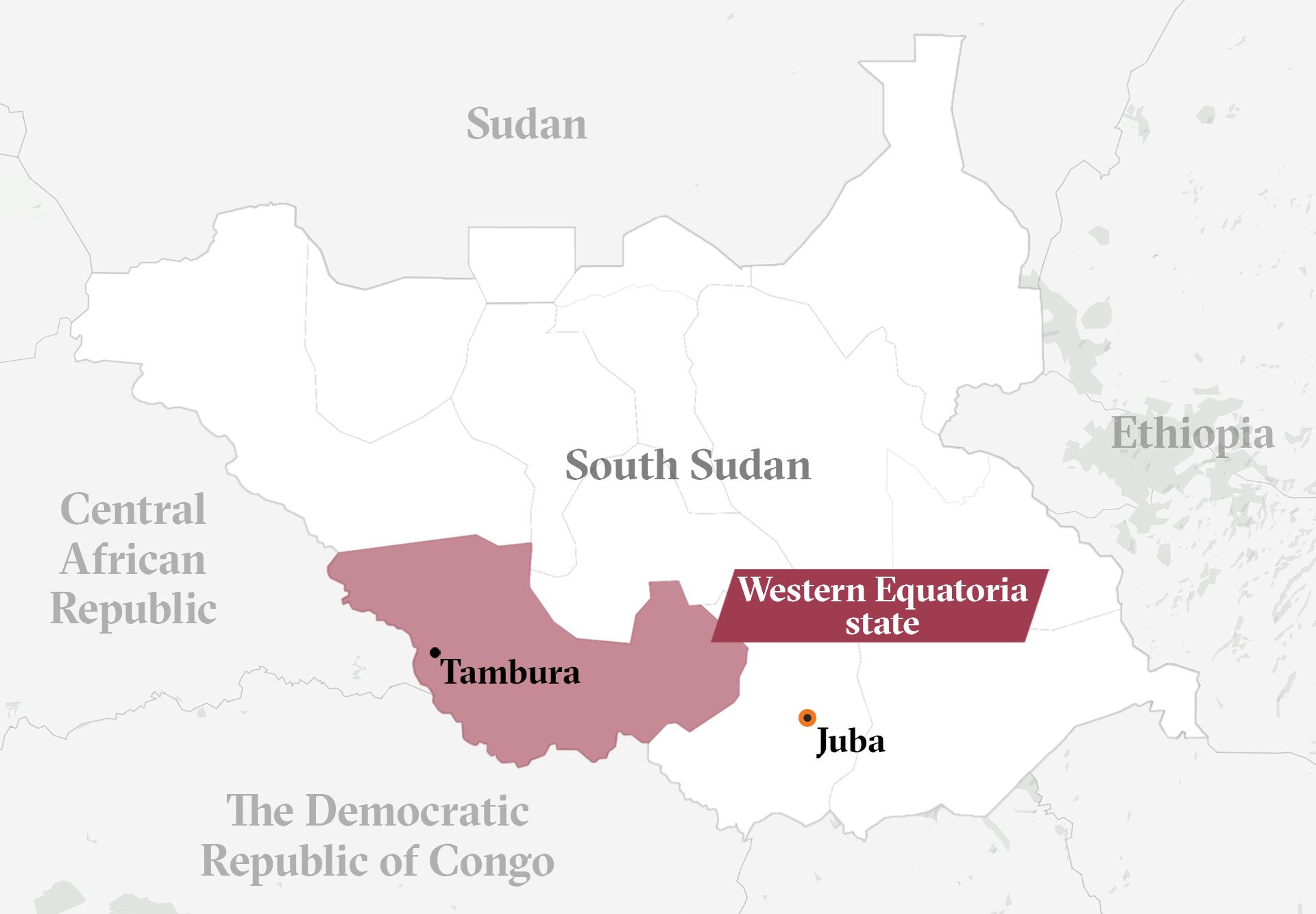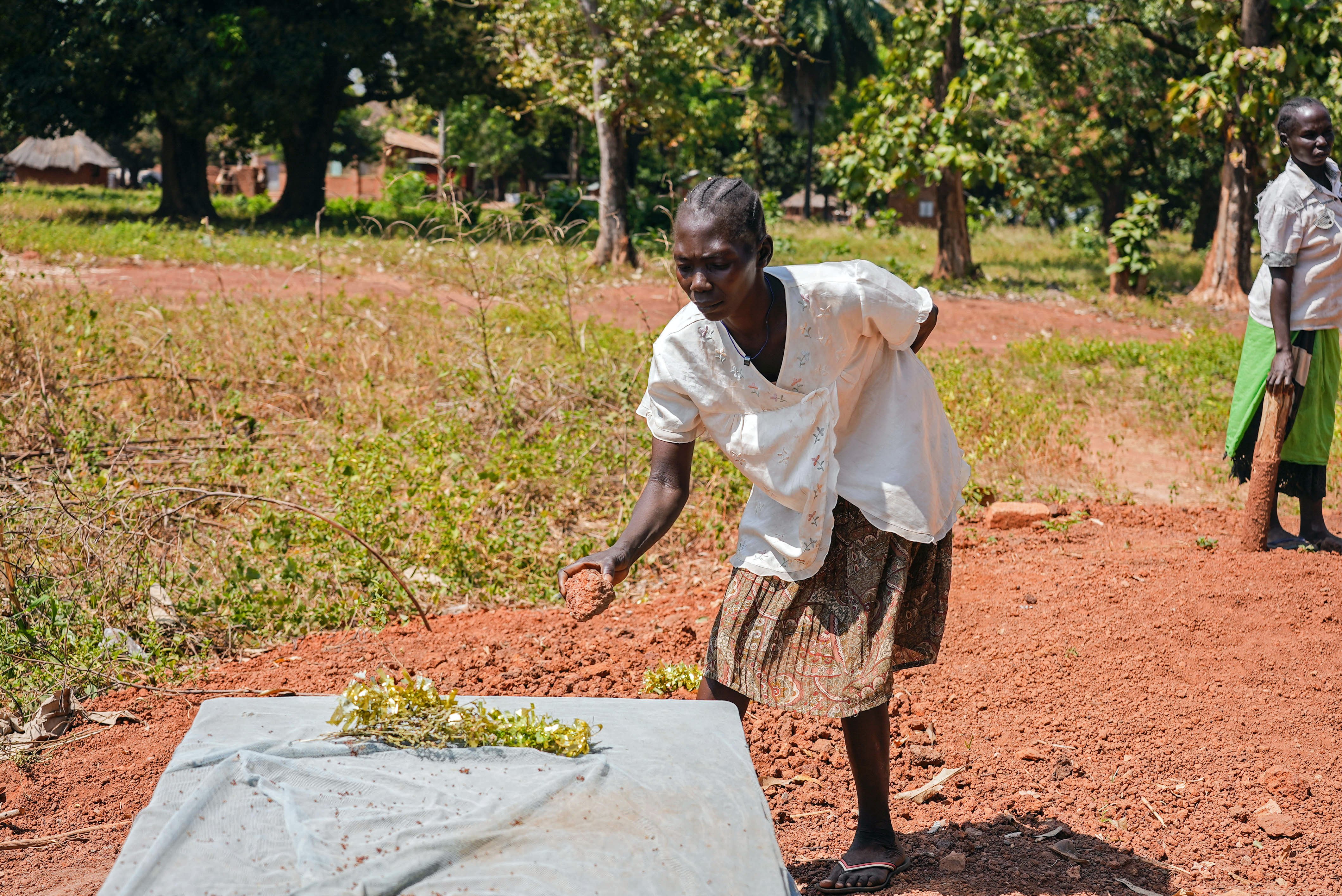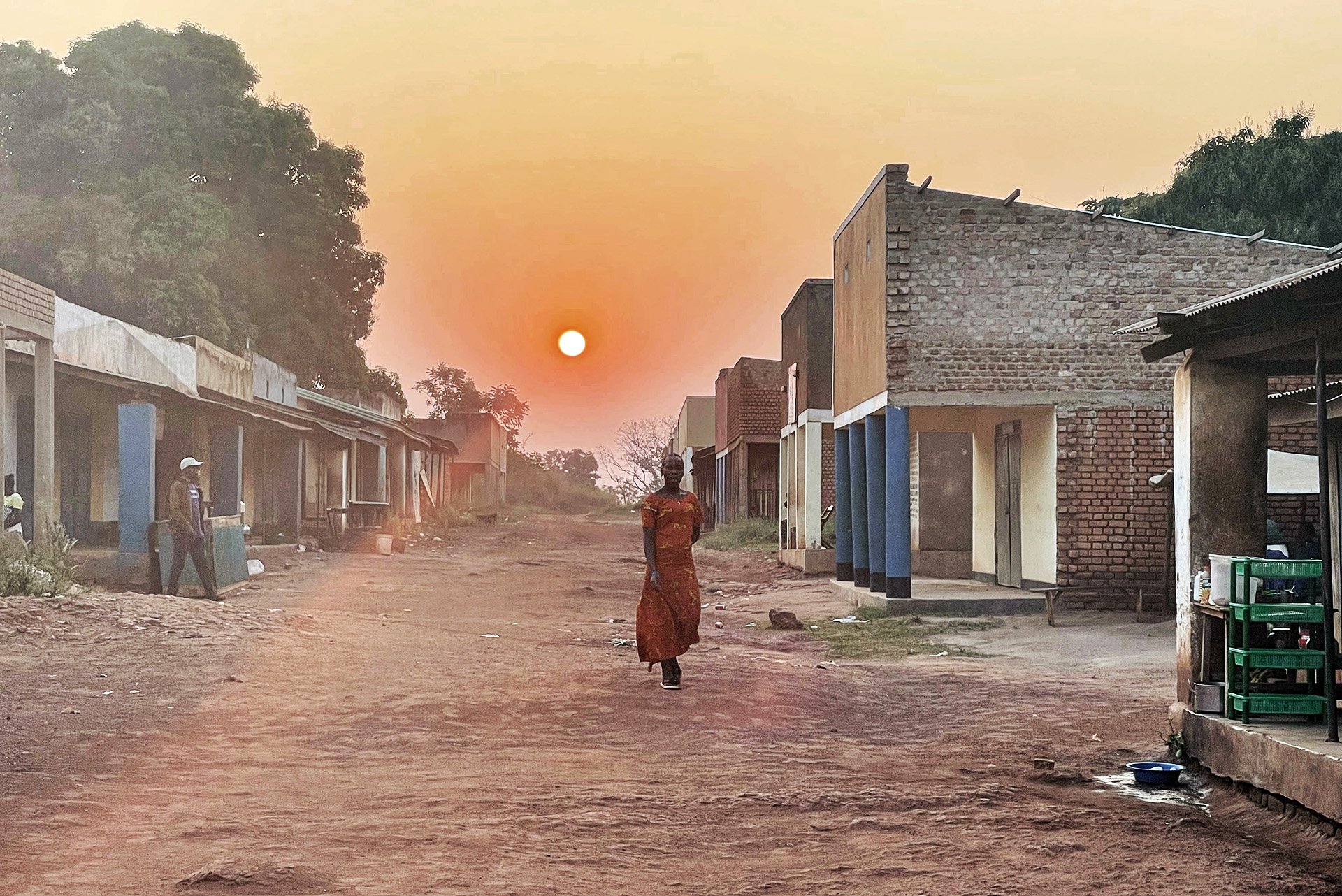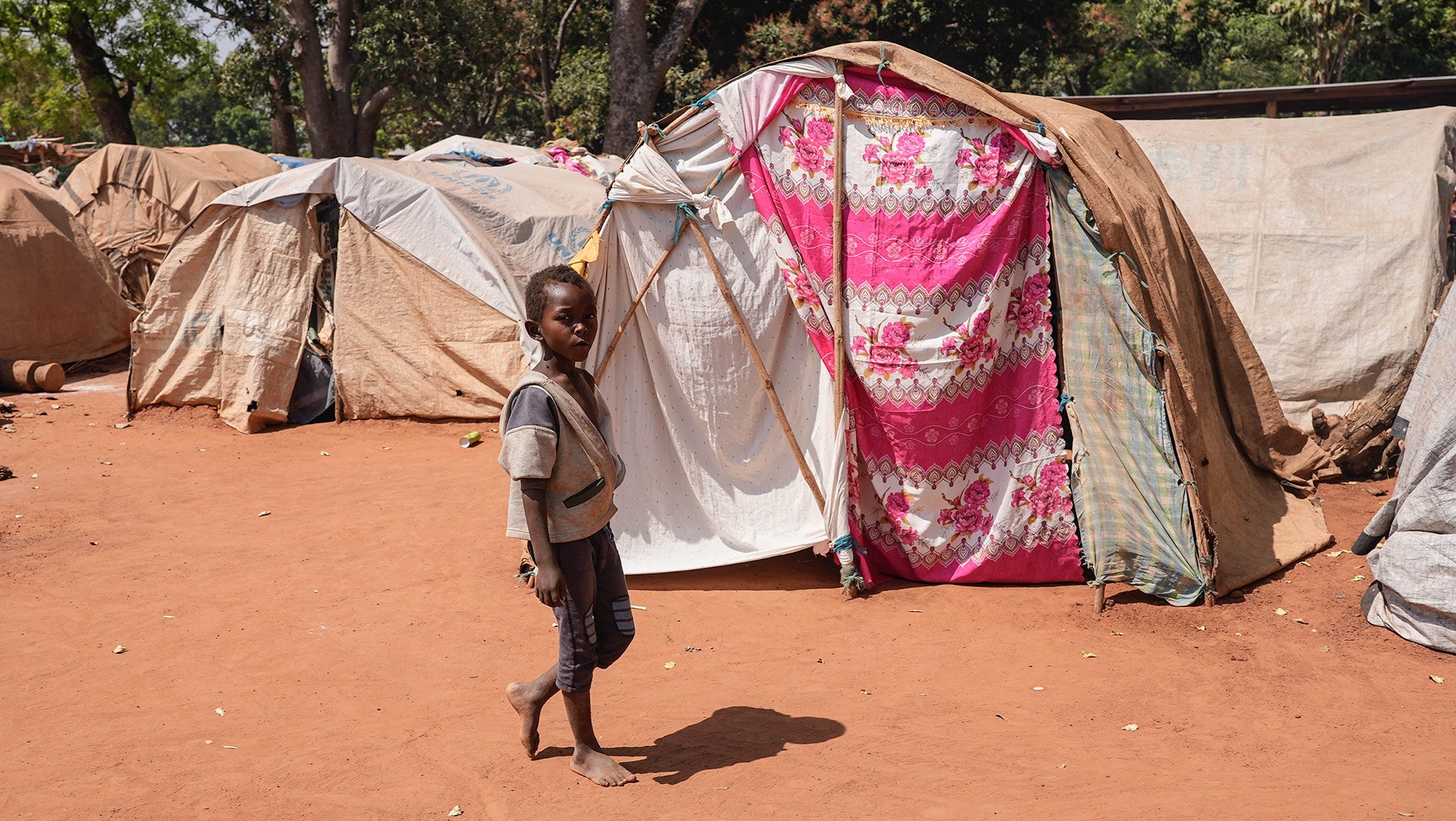The remote county of Tambura, in the breadbasket state of Western Equatoria, went largely unscathed during five years of devastating conflict in South Sudan that killed almost 400,000 people.
But the county that survived a civil war has fared less well in a time of peace, as a fragile 2018 power-sharing accord between the ruling party and opposition groups triggers new conflicts that have polarised communities across this country of 11 million.
“We had hoped the war wouldn’t reach us,” said Tambura resident Bibiana Luca, sitting in a displacement camp across the road from a cemetery where she said roughly 150 bodies had been buried in collective graves.
Residents said the victims were killed by militias tied to elites seeking control over Western Equatoria, which was long held by ruling party appointees but is now, thanks to the power-sharing deal, led by an opposition-picked governor.
South Sudan’s civil war broke out in 2013 between forces loyal to President Salva Kiir and rebels led by his then deputy, Riek Machar. After signing the 2018 agreement, the rivals formed a unity government in 2020. Machar was again made vice president.
The UN’s peacekeeping mission in South Sudan, which has more than 13,000 troops on the ground and is known by its acronym UNMISS, claims political violence has reduced since the 2018 deal was signed.

But other UN experts and conflict-monitoring groups say such violence has in fact soared as politicians compete among one another for posts in the transitional unity government.
Though the number of displaced people initially fell following the agreement, it has since increased again to over 4.3 million and is now close to its peak. 2022 is, meanwhile, expected to be South Sudan’s hungriest in more than a decade, according to the UN.
The New Humanitarian visited Tambura – a western town and county close to the border with Central African Republic – late last year, becoming one of few international media outlets to document a crisis that has seen hundreds killed and at least 80,000 displaced.
The devastation was plain to see in Tambura town: Local buildings were riddled with bullets, burnt houses lined abandoned neighbourhoods, and residents shared images of relatives’ charred bodies and corpses being pulled out of latrines.
The conflict and resulting displacement crisis has created challenges for humanitarian agencies, which have had to send support to a traditionally food-sufficient area even as they slash aid rations elsewhere due to funding constraints.
And though fighting has eased since October – following an agreement between local authorities, the military, and community leaders – sporadic clashes have continued, forcing residents to abandon their homes and fields.
“We depend on agriculture, and the conflict happened during the harvest,” said Susana Weka, a 33-year-old from Tambura who said her husband was killed by militias last year in a village close to the town.
“[When the civil war ended], we felt happy we survived it, but unfortunately war erupted [here] and we don’t know why,” Weka told The New Humanitarian from a displacement camp beside a church. “We just want to live in peace like the way things were.”
Power-sharing problems and a ‘senseless’ war
South Sudan became independent in 2011 after enduring centuries of slave-raiding, colonial neglect by British administrators who deliberately underdeveloped the region, and brutal rule by Khartoum.
The civil war in 2013 resulted in an initial peace accord two years later, though the deal fell apart amid renewed clashes between Machar and Kiir’s forces. The war then expanded into Equatoria – a region that includes Western Equatoria – though Tambura remained largely untouched.
Though the current peace deal has lasted longer, implementation has been sluggish. Thousands of government and opposition forces languish in training sites waiting to join a unified army, while justice and reconciliation provisions are frozen.
Analysts say aspects of the accord focused on power-sharing are responsible for much of the current unrest. According to the deal, conflict parties are entitled to appoint a designated share of governors, county commissioners, and other local positions.
This system has led to a crisis of political legitimacy as Juba elites choose leaders who locals don’t recognise, while the replacement of ruling party figures with opposition picks has disrupted what some politicians see as areas they have a right to control.
In Western Equatoria, most governors were previously appointed because of their strong ties to Kiir’s party and to the locally pre-eminent Avungura clan of the Azande group, who constitute a majority in Tambura.
But in mid-2020, Machar chose Alfred Futuyo – a former opposition commander and half-Balanda (a minority group in Tambura) for the job – one of several governorships his party obtained through the accord.

Politicians from Juba were then accused of supporting the formation of an Avungura-led militia reportedly backed by troops loyal to Kiir’s party, while a mostly Balanda militia was created with alleged support from opposition forces.
Both sides want to manage the state ahead of elections planned for 2023, according to analysts, and they have chosen Tambura as a battleground because political rivalries between the Azande and Balanda are most intense there.
“There is an opportunity to use control of local authority to seize an incumbency advantage,” said Mark Millar, an analyst for the Norwegian Refugee Council in South Sudan.
Having an incumbent advantage ahead of elections can benefit local officials in several ways. They may use state powers to control ballot boxes, for example, or to hinder media, civil society groups, and political leaders who oppose them.
"I think everyone understands that there will be no democratic process, but whoever controls the ballot box will end up victorious," said an analyst in South Sudan who asked not to be named citing the sensitivity of the issue. "I think the Avungura [in Western Equatoria] probably correctly think their preeminent position would be in danger."
Though conflict in Tambura and other parts of South Sudan is political, the violence itself tends to play out between community militias, since elites now prefer to avoid direct confrontation, said Ferenc David Marko, a researcher for the Small Arms Survey, which monitors conflict in South Sudan.
“Politicians of the different sides of the civil war cannot fight their political enemies on the battleground, as officially peace returned to the country,” said Marko. “[So] they found ways to radicalise the peripheries.”
Though accounts of who triggered the violence vary, several interviewees cited community meetings in April and June 2020, when Azande leaders allegedly called for non-Azandes in Tambura to be killed or banished.
Clashes intensified in mid-2021, further polarising communities, who told The New Humanitarian they had lived together with no major issues prior to the formation of the unity government.
Speaking from displacement camps outside churches or under trees next to military and UN bases, residents recounted brutal violence: unborn babies being ripped out of women’s wombs and bodies being dumped in wells.
Between August and September 2021, more than 2,000 people sought shelter in a local orphanage, said Bianca Bi Musungu, a nun who runs the home. She said the displaced left family members behind, including a child and elderly people unable to flee.
Musungu said an elderly man who was sheltering at the orphanage was killed in September while collecting ground nuts in his field. His body was found later, half-eaten by animals.
Luca, meanwhile, said her brother was also killed late last year while escaping the town during clashes. His body, like many others, was left on the road because it was too dangerous to retrieve. Luca said her house was burnt down during the violence, which resulted in her losing schooling documents for her children and medical paperwork she needs to access HIV medication. She described the war as “senseless”.
Cashed-strapped aid groups ‘cannot respond adequately’
Since the October agreement involving community leaders in Tambura was signed, government and opposition troops have relocated outside of the county, while some local militias have turned over their weapons and promised to stop fighting.
“We are very sorry for what has happened,” said Akile Joseph, one of four Balanda-aligned fighters who spoke to The New Humanitarian. The group admitted to killing men over 18, though denied receiving support from the opposition or politicians.
Still, local residents said they don’t feel safe and worry that militias are hiding in nearby forests, preparing to fight. “People are still in the bush. Maybe someone will come and kill me at night,” said Daniel Michael, a displaced person living beside a military post.

Wesley Welebe, an official who led an investigation into the fighting for the Joint Defence Board (JDB), a body charged with implementing parts of the peace deal, said he had received reports of Azande youth being recruited from displacement sites.
Welebe blamed much of the violence in Tambura on James Nando, an Azande former opposition commander who defected to Kiir’s party and joined the fighting last August. Nando claims to take orders from the National Security Service, according to a well-placed UN official who was present during talks with the militia leader.
While the conflict in Tambura involves local actors, it is closely connected to national political dynamics, say conflict analysts, UN officials, and sources in the South Sudanese military.
According to an internal UN conflict analysis document seen by The New Humanitarian, a “powerful alliance” of Avungara politicians has been “coordinating efforts in Juba to undermine the role of [Alfred] Futuyo [the half-Balanda opposition-appointed governor of Western Equatoria]… while bolstering their own influence in the state”.
These officials are accused of supporting James Nando, an Azande former opposition commander who defected to the ruling party and joined the fighting last August. He is held responsible for some of the worst atrocities.
During a meeting in Tambura attended by UN and government officials, Nando said his orders “only come from the blue house” – a jail run by the National Security Service – said a UN official at the meeting who was not authorised to speak to the media.
The New Humanitarian could not confirm whether the National Security Service was involved in the conflict, though analysts say Kiir’s party has consistently tried to weaken and undermine the opposition throughout the peace process.
At a meeting in Juba, Nando told The New Humanitarian that he was acting in self-defence after his troops were attacked by opposition soldiers. “[People] just want to destroy my name because they want to bring me down,” he said.
Other Azande residents in Tambura also accused opposition soldiers of committing atrocities, with some accounts suggesting they fought alongside the main Balanda militia, which is led by Angelo Davido, previously known for his role fighting against the Lord's Resistance Army, a Ugandan armed group.
Opposition army spokesperson Lam Paul Gabriel admitted its troops had killed and raped people, but said Nando’s forces attacked first. “Some soldiers took matters into their [own] hands because they believed they [were] being targeted,” Gabriel said.
Most Tambura residents who spoke to The New Humanitarian said they didn’t really understand who was stoking the violence, and that finding food and shelter were their main priorities.
Several residents in displacement camps said they had only received food from aid groups once since May 2021. Others said they tried to return home because their children were hungry, only to find their houses looted and crops destroyed.
Workers from relief organisations said they had struggled to assist the town’s inhabitants due to insecurity. During heavy fighting last year, activities were suspended and compounds were vandalised and looted.
The Tambura crisis has impacted other parts of South Sudan, said Matthew Hollingworth, country representative for the World Food Programme, which assisted almost five million people in the country last year.
Hollingworth said aid groups are now unable to source food from the fertile, agricultural county, and that diverting resources to those in need means spreading assistance “even thinner” elsewhere. On top of “localised violence”, he said aid groups are having to respond to a third year of mass flooding that has cumulatively impacted millions of people around the country.
“Too many people are, for the first time, desperate for all-year-round help, and a cash-strapped humanitarian community simply cannot respond adequately,” Hollingworth added.
A message to the international community: ‘Engage with other voices’
Welebe of the JDB said sustainable peace in Western Equatoria needs a state cabinet reshuffle, a unified national army composed of government and opposition troops, and dialogue between local communities.
If none of this happens, the conflict could spread to other parts of the country where there have already been targeted killings of Azande and Balanda, including the capital, Juba, Welebe added.
Others said the peace agreement needs a more fundamental rethink.
“We have a problem of leadership, and we have a problem of political will,” said Abraham Awolich, a founding member of the People's Coalition for Civil Action, a civil society group. “[The international community] should consider [the unity administration] a failing government which has lost legitimacy and should begin to engage with other voices.”
Tambura resident Lucia Anton – who lost her husband to the violence last year and was badly injured alongside her 11-year-old son in the same incident – said she was sceptical of any initiative seeking to stabilise her town.
“During the war, I wasn’t worried about being in Tambura,” Anton said from a displacement camp adjacent to a UN base. “[But] now there is no sign of lasting peace… Even if someone comes to discuss peace, we won’t believe them.”
Edited by Philip Kleinfeld.






